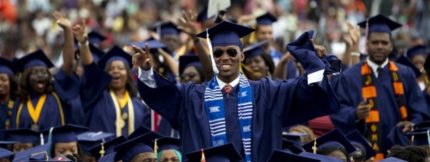
A Huffington Post story stated that 22 percent of Virginia high school graduates are Black. But only 5 percent of students at the University of Virginia are Black. However, Virginia is not the only state with this problem. About 30 percent of high school graduates in Delaware are Black, but Blacks make up 5 percent of the student body. Thirty four percent percent of high school graduates in Georgia are Black, but they make up only 7 percent of college students in the state.
So where are Black students going? According to HuffPost, many of them are opting to go to less expensive community colleges. Others are choosing to attend for-profit schools like ITT Tech or the University of Phoenix. However, for-profit colleges are not necessarily cheaper and come with their own problems. Students are often pressured into taking large, government-backed loans, and can end up with worthless degrees.
Corinthian College, a for-profit school, shut its doors in April leaving thousands of students with huge debts and no college education. The federal government had to forgive more than $100M in debt from students who were defrauded by the school. The University of Phoenix is facing declining enrollment and has been barred from recruiting military personnel. Huff Post said that for-profit colleges have the worst graduation rates in education.
Many students see community colleges as a cheaper alternative, but they have their problems too. Community colleges are facing declining budgets, students struggle to get into the right classes, and when they graduate, they can be stigmatized because they didn’t graduate from a prestigious university. Additionally, students at these schools might have worse graduation rates because they have less resources than flagship schools.
According to Huff Post, Black and Latino students with above average SAT scores go to college at the same rate, but white students are more likely to finish if they attend more selective schools with more resources and better graduation rates. When Black and Latino students attend selective schools their graduation rate is 73 percent, compared to 40 percent at other colleges. However, many students think the cost of an education is more important than the school’s graduation rate.
“There are plenty of smart people here,” said Julian Lopez, a student at Capital Community College in Hartford, Conn. “But everything’s about the money. The majority of people who come here, it’s because they can’t afford to go to more expensive schools. It depends on how much money you have and how much money your parents make.”
The Huff Post suggests that many prestigious colleges are moving away from trying to recruit Black or low-income students, because their graduation rates are lower than students from middle-class or upper income backgrounds. Colleges are obsessed with their graduation rates, and they may be reluctant to admit low-income students of color, because they fear they may not graduate.
Graduation often depends on your family background. If you come from an upper or middle-class background you have a better chance of graduating than if you come from an impoverished background. A study by researchers from New York University and the City University of New York showed increases in tuition rates are followed by decreases in college diversity. Simply put, as the price of college goes up, the number of Black and brown students goes down.
Anthony Carnevale, director of the Georgetown University Center on Education and the Workforce, said the rising cost of higher education is making economic inequality even worse.
“Higher education is making it worse, not better, for many students,” said Carnevale. “College now takes the disadvantages that begin at birth, and then magnifies them.”
The lack of Black students at flagship schools eventually makes it difficult to recruit other Black students. Aryn Frazier, president of the Black Student Alliance at the University of Virginia (UVA), said many Black students avoid going there because of the lack of diversity.
“You can give black students a graduate student to spend the night with, and invite all black students down on the same weekend, but I think at the end of the day people can see the culture at UVA,” she said.

